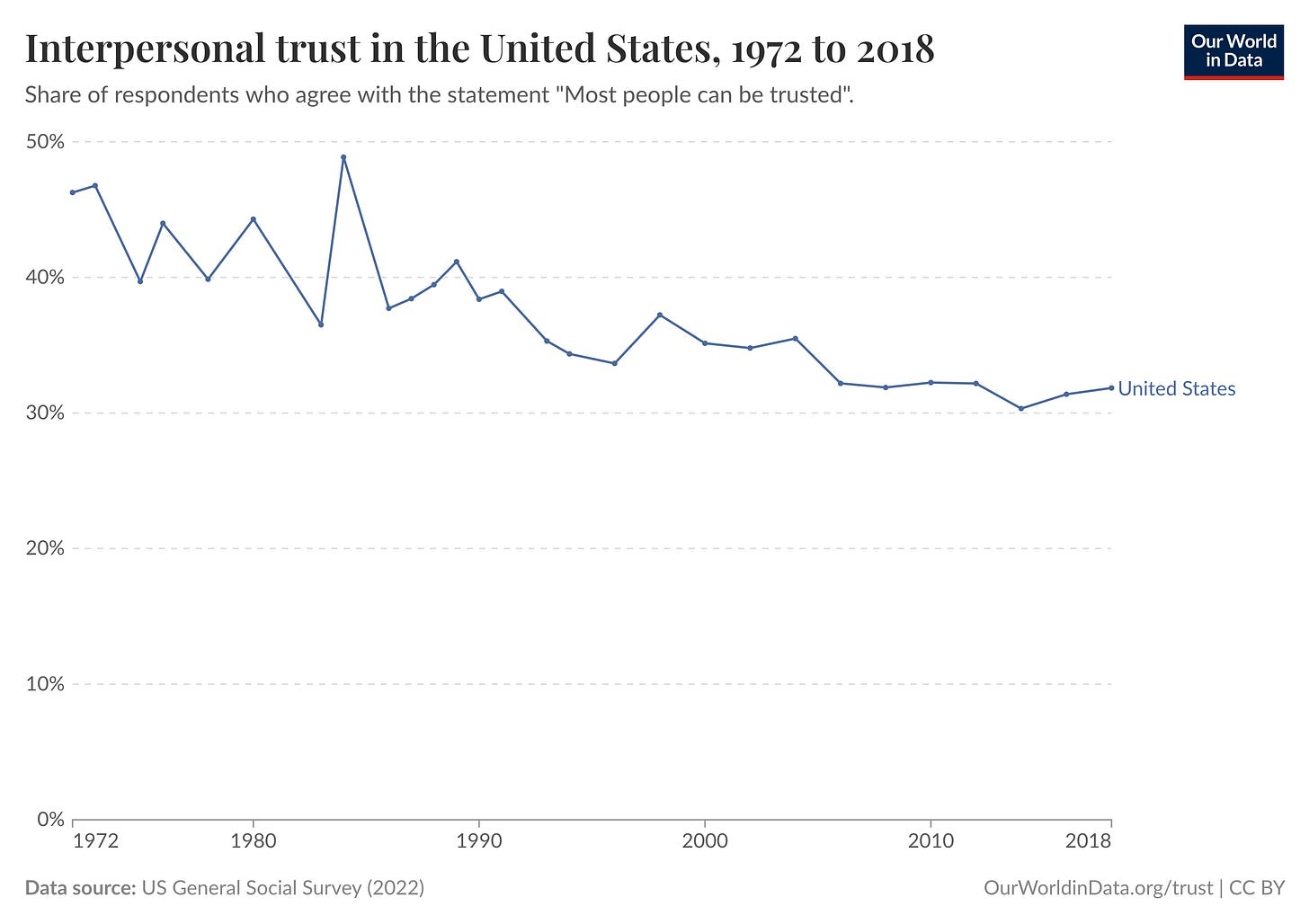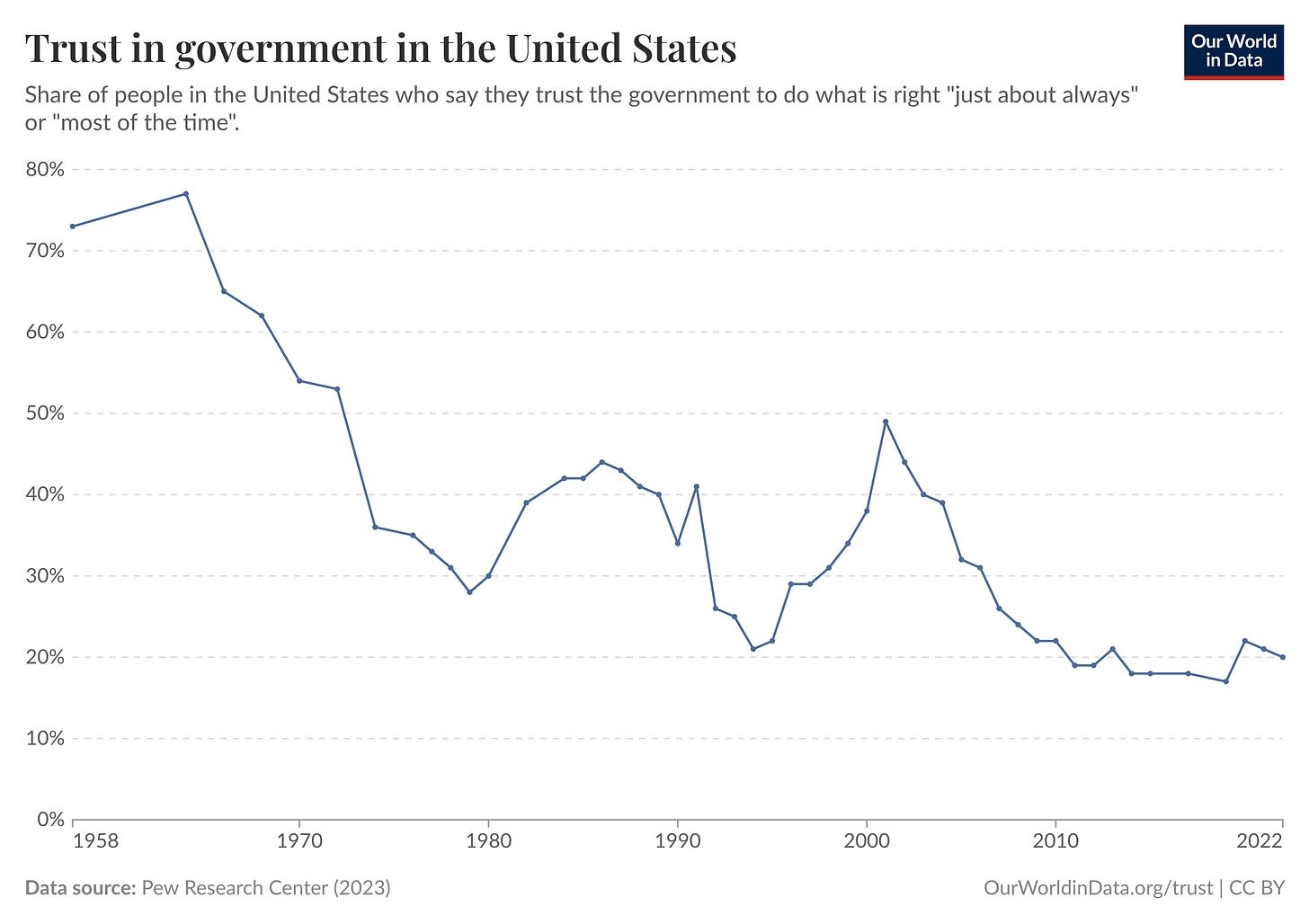How worker co-ops can help restore social trust
post by B Jacobs (Bob Jacobs) · 2025-04-17T14:14:47.165Z · LW · GW · 5 commentsThis is a link post for https://bobjacobs.substack.com/p/how-worker-co-ops-can-help-restore
Contents
Read the full post here None 5 comments
The US is experiencing a great decline in trust. According to the US General Social Survey, people who agreed with the statement "most people can be trusted" went from 49% to 25% between 1984 and 2022.
Trust in institutions is also falling. Over that same period trust in the government fell from 42% to 20%.
For civil services it fell from 56% to 41%, for the police it fell from 74% to 68%, and for congress it fell from 52% to a whopping 15%.
Read the full post here
5 comments
Comments sorted by top scores.
comment by cdt (nc) · 2025-04-17T14:46:18.705Z · LW(p) · GW(p)
This was a thought-provoking essay. I hope you consider full mirroring posts here in the future as I think you'll get more engagement.
Replies from: Bob Jacobs↑ comment by B Jacobs (Bob Jacobs) · 2025-04-17T16:23:57.053Z · LW(p) · GW(p)
Thanks! Yeah, I think I'll do that (in a couple weeks)
comment by Jiro · 2025-04-17T22:24:06.053Z · LW(p) · GW(p)
The alternative theory is that political bias has gotten much greater, and the acceptable political beliefs are strongly in the direction of trusting some groups and not trusting others. By that theory, progressive movements are trusted more because they have better press. Realizing that you can increase trust by creating worker co-ops would then be an example of Goodhart's Law--optimizing for "being trusted" independently of "being trustworthy" is not a worthy goal.
comment by Brendan Long (korin43) · 2025-04-17T18:51:28.236Z · LW(p) · GW(p)
It used to be that we had a two-tiered citizenry: one class owned and controlled the nation’s government (the nobility) and one class merely worked for said nation (the laborers). Then we decided that the laborers should also partially own and control the government. However, this practice was not extended to the workplace, which remains in that classic hierarchy to this day; with one class owning and controlling the firm, while the other class merely works for it.
This is not true? There are no legal restrictions on what class of people can own and control firms. Many worker-owned co-ops exist[1], and even among public corporations, around 40% of stock is held by workers in retirement accounts[2]. In some industries, it's very common to receive stock as compensation too. A lot of small businesses are tautologically worker-owned since they only have one employee (the owner).
Just because we don't legally mandate that every business is a co-op doesn't mean they aren't legal and don't exist.
- ^
I suspect very large worker-owned co-ops are uncommon since the value of a slice of ownership goes down as the size increases, but there's no legal restrictions on the size of a co-op.
- ^
This is an underestimate of stock owned by workers since it doesn't include taxable savings, but it would be hard to separate wage labor from the labor of creating and running companies in taxable accounts. Retirement accounts should be representative of 'normal workers' since there are low per-person caps and it's hard to fund them with anything except wages.
↑ comment by B Jacobs (Bob Jacobs) · 2025-04-17T19:13:21.593Z · LW(p) · GW(p)
Since I talked about existing worker co-ops I obviously knew co-ops exist, and this was (I had hoped clearly) talking about conventional firms, which do not have that structure. Even when workers own stocks in conventional firms, they (in the vast majority of cases) do not have control. I made a whole post about this if you're interested.

